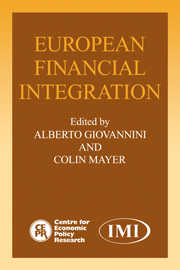Book contents
- Frontmatter
- Contents
- List of figures
- List of tables
- Preface
- List of conference participants
- Foreword
- 1 Introduction
- 2 Banking competition and European integration
- Discussion
- 3 Banking, financial intermediation and corporate finance
- Discussion
- 4 How (not) to integrate the European capital markets
- Discussion
- 5 European financial regulation: a framework for policy analysis
- Discussion
- 6 Corporate mergers in international economic integration
- Discussion
- 7 Capital flight and tax competition: are there viable solutions to both problems?
- Discussion
- 8 Reflections on the fiscal implications of a common currency
- Discussion
- 9 Currency competition and the transition to monetary union: does competition between currencies lead to price level and exchange-rate stability?
- 10 Currency competition and the transition to monetary union: currency competition and the evolution of multi-currency regions
- Discussion of chapters 9 and 10
- 11 Problems of European monetary integration
- Discussion
- Index
2 - Banking competition and European integration
Published online by Cambridge University Press: 04 August 2010
- Frontmatter
- Contents
- List of figures
- List of tables
- Preface
- List of conference participants
- Foreword
- 1 Introduction
- 2 Banking competition and European integration
- Discussion
- 3 Banking, financial intermediation and corporate finance
- Discussion
- 4 How (not) to integrate the European capital markets
- Discussion
- 5 European financial regulation: a framework for policy analysis
- Discussion
- 6 Corporate mergers in international economic integration
- Discussion
- 7 Capital flight and tax competition: are there viable solutions to both problems?
- Discussion
- 8 Reflections on the fiscal implications of a common currency
- Discussion
- 9 Currency competition and the transition to monetary union: does competition between currencies lead to price level and exchange-rate stability?
- 10 Currency competition and the transition to monetary union: currency competition and the evolution of multi-currency regions
- Discussion of chapters 9 and 10
- 11 Problems of European monetary integration
- Discussion
- Index
Summary
Introduction
European integration poses a challenge to the study of competition in banking and financial markets. The Price Waterhouse (PW) study for the European Commission on the ‘costs of non-Europe’ in financial markets concluded that important welfare gains could be attained by the increase in competition which would accompany financial integration. This study has been much debated and criticized on the grounds that it overestimates the gains to be obtained by assuming that integration will lead to a competitive market.
The crucial issue seems to be the impact of the process under way on the degree of competition in banking, and more particularly in retail banking, where the effects are likely to be the largest. Many other questions revolve around this issue:
Will deregulation induce excessive competition?
How will the benefits of integration be distributed?
What specific predictions on conduct and market structure, trade and direct investment can be made?
How will the stability of the financial system be affected?
Are the regulations to be implemented consistent?
In the present paper I try to draw some lessons from recent research in finance, banking and industrial organization on how competition will be affected by the integration process. This is not an easy task since at a theoretical level financial intermediation is still not well understood, and competition among financial intermediaries even less so.
Any attempt to understand the way financial institutions compete must start by examining the role of financial intermediaries, the potential for market failure and the need for regulation.
- Type
- Chapter
- Information
- European Financial Integration , pp. 9 - 31Publisher: Cambridge University PressPrint publication year: 1991
- 29
- Cited by



